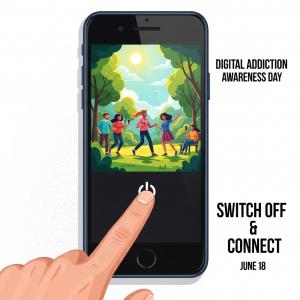With Teen Depression Doubled, June 18 'Switch Off' Targets Digital Addiction
A global initiative calls for a 24-hour digital detox to combat addictive tech and promote real-world connection and mental wellness.
"It was like he was physically in the room, but his mind was somewhere else entirely," Maria shared. "The bright boy I knew was being replaced by someone anxious and perpetually distracted."
Alex’s experience is a deeply personal glimpse into a global issue: digital addiction. This isn't a distant problem; it's a pressing crisis subtly reshaping lives and demanding worldwide attention. Conflicts over screen time are common, with a 2024 Pew Research Center survey revealing that 38% of parents and teens report regular arguments about phone use.
The statistics are stark. A major 2022 meta-analysis in Clinical Psychology Review, covering over 2.1 million people, found that an estimated 26.99% may experience smartphone addiction, 17.42% social media addiction, 14.22% internet addiction, and 6.04% gaming addiction.
In regions like Hong Kong, the rise of specialized rehabilitation centers for digital addiction is a stark indicator of what may become more common globally if these trends continue. Digital Addiction Awareness Day, observed annually on June 18, aims to bring this challenge into sharp focus. It is an initiative striving to become the primary global day dedicated to this cause.
Young people are particularly at risk. The U.S. Surgeon General's 2023 Advisory noted that teens spending over three hours daily on social media face double the risk of depression and anxiety symptoms. Social psychologist Jonathan Haidt, in his book The Anxious Generation, further details how the decline in teen mental well-being correlates with the rise of smartphone use. His research highlights a troubling reality: many teens now average over seven hours of daily screen time for entertainment alone, outside of schoolwork.
The economic impact is also considerable. The global online gambling market alone is projected by Mordor Intelligence to exceed $103 billion in 2025. But the human cost is even more devastating. The harm from gambling addiction—intensified by its constant online accessibility and AI-driven platforms—is profound. Problem gambling is linked to severe consequences, including tragic rates of suicide. Experts like Jay Sayta, an Indian technology and gaming lawyer, has raised concerns about insufficient enforcement of regulations and advisories regarding online gambling advertising.
This crisis isn't simply about weak willpower; it's significantly fueled by "addictive-by-design" technology. Dr. Anna Lembke, psychiatrist and author of Dopamine Nation, describes the smartphone as "the modern-day hypodermic needle, delivering digital dopamine 24/7." Sophisticated Artificial Intelligence (AI) algorithms are increasingly engineered to maximize user engagement by tapping into the brain's reward systems, a fact noted in numerous analyses of persuasive technologies.
Inspiring legislative efforts, like Vermont's S.80 bill (proposing a Digital Addictions Awareness Day with free state park entry) and moves in France to ban phones in schools, offer models for action. The digitaladdictionawareness.org website is developing as a resource hub, with the long-term vision of seeking broader international recognition for the Day. Key policy goals include protecting young people through measures like smartphone-free classrooms, holding tech companies accountable with requirements for algorithm transparency, and building community resilience through awareness and screen-free initiatives.
Digital Addiction Awareness Day on June 18th calls for a conscious pause. The core initiative this year is a 24-hour "Switch Off" challenge, encouraging individuals and communities globally to disconnect from their devices. The day aims to increase understanding of digital addiction, promote healthy tech habits, and advocate for systemic changes.
Digital addiction is a complex issue impacting mental health and society at large. June 18th is an opportunity to confront this challenge collectively and advocate for a future where technology empowers, not ensnares. The date June 18 is chosen strategically, often falling near Father's Day and aligning with Juneteenth (June 19th) and International Picnic Day (June 18th)—events that naturally foster outdoor activities and real-world connections over virtual ones.
International Digital Addiction Awareness Day
Yearly Observance June 18
email us here
Visit us on social media:
X
Legal Disclaimer:
EIN Presswire provides this news content "as is" without warranty of any kind. We do not accept any responsibility or liability for the accuracy, content, images, videos, licenses, completeness, legality, or reliability of the information contained in this article. If you have any complaints or copyright issues related to this article, kindly contact the author above.
AME Institute Burbank 2025 Programming Hi-Lights
Apogee Travel and the Scott Hamilton CARES Foundation Partner to Give Purpose to Every Journey
America’s Essential Hospitals Highlights Member Work in Improving Health Care
Kalendarium
Więcej ważnych informacji
 Jedynka Newserii
Jedynka Newserii

 Jedynka Newserii
Jedynka Newserii

Finanse

Uchodźcy z Ukrainy pomogli wygenerować 2,7 proc. PKB Polski w 2024 roku. Napływ nowych pracowników znacznie zmienił polski rynek pracy
Uchodźcy z Ukrainy coraz lepiej radzą sobie na polskim rynku pracy – pracuje 69 proc. z nich – wynika z najnowszego badania przeprowadzonego przez Deloitte dla UNHCR. Jednocześnie wciąż w tym obszarze jest wiele wyzwań, w tym bariery językowe czy kwestie dotyczące uznawania kwalifikacji, np. w zawodach medycznych i prawniczych. Na rosnącej aktywności zawodowej Ukraińców mocno skorzystała polska gospodarka, ale też sam rynek pracy: wzrosła konkurencja, a Polacy uzyskali możliwość specjalizacji i objęcia stanowisk menedżerskich, eksperckich i technicznych.
Ochrona środowiska
W UE wciąż więcej kontroli działań firm w ramach ESG niż zachęt. Konieczne jest złagodzenie podejścia

Instytucje unijne powinny bardziej koncentrować się na celach i możliwościach rozwoju, jakie daje ESG, a nie kontroli działań firm w tym obszarze i obowiązków sprawozdawczych – twierdzą przedstawiciele organizacji Business for Good. Konieczne jest więc złagodzenie obowiązujących regulacji. Europa powinna również dążyć do utworzenia wspólnego rynku o ujednoliconych przepisach i mechanizmach.
Konsument
Wakacje wyzwaniem dla operatorów komórkowych. W najpopularniejszych kurortach ruch w sieci rośnie nawet pięciokrotnie

Długie weekendy i wakacje to wymagający czas dla operatorów komórkowych. W najbardziej obleganych kurortach udział abonentów tylko sieci Play w stosunku do liczby mieszkańców przekracza 500 proc. Dlatego operator planuje dalszą rozbudowę swojej sieci komórkowej do minimum ponad 15 tys. stacji bazowych. W latach 2020–2024 Play zainwestował w sieć i częstotliwość ponad 6 mld zł.
Partner serwisu
Szkolenia

Akademia Newserii
Akademia Newserii to projekt, w ramach którego najlepsi polscy dziennikarze biznesowi, giełdowi oraz lifestylowi, a także szkoleniowcy z wieloletnim doświadczeniem dzielą się swoją wiedzą nt. pracy z mediami.








.gif)

 |
| |
| |
|